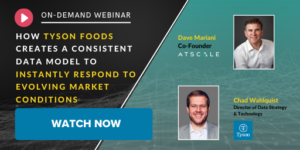March 4, 2019
Two Ways That AtScale Delivers Faster Time To Insight: Dynamic BI Modeling and Improving Query Concurrency

In our most recent webinar, Chad Walhquist of Tyson Foods and Dave Mariani, Co-Founder and Chief Strategy Officer of AtScale shared the techniques that Tyson Foods uses to make insight-driven decisions to respond to the changing market with their data. Couldn’t attend the webinar? In this blog post, we share a brief recap of what you missed!

Tyson Foods feeds the world. According to Wahlquist, on average “One in every five pounds of protein that people consume in the U S comes from Tyson Foods.” With this volume, how are they keeping up and building a data-driven organization? Chad speaks to this challenge while working towards the goal of making Tyson Foods a “world premiere protein provider.”

“We love OLAP. We love the ability to give that guardrail where I can get answers to questions and it allows the concept of dimensions and measures.” Chad reflects on Tyson Foods’ five year technology journey, and how overcoming challenges with processing power and scalability led them to discovering AtScale.
“We’re trying to make data available, data availability that has scale.” Why? Chad shares his team’s main focus:
- No Ops: OnPrem>IaaS>PaaS>Serverless
- Service/Solution Elasticity (Unbounded Scale)
- Advanced Analytics- ML/ Predictive/ Prescriptive
- Big Data $ Models- Separation of Storage and Compute
- Cloud Native
- Public/Syndicated Data
Wahlquist walks us through the concept of the team’s building blocks. He shares how each part of this concept helps his team move quickly, “The core piece is in our semantic layer where we define calculations. How we calculate time intelligence, so that way we’re not materializing 14 different versions of time intelligence. That’s why we’re not having all these KPIs and other, on row or off-road calculations. So it’s all about doing it in the right layer.” He later shares how the building blocks creates a more dynamic environment as there is transparency throughout the organization.
In this demonstration, Dave shares how you can create a data model and enhance it with third party data to be able to predict and evolve with the changes in the market and quantify sales with the impact of COVID-19.
Want to view the full webinar? Catch the on-demand webinar here.




Power BI/Fabric Benchmarks